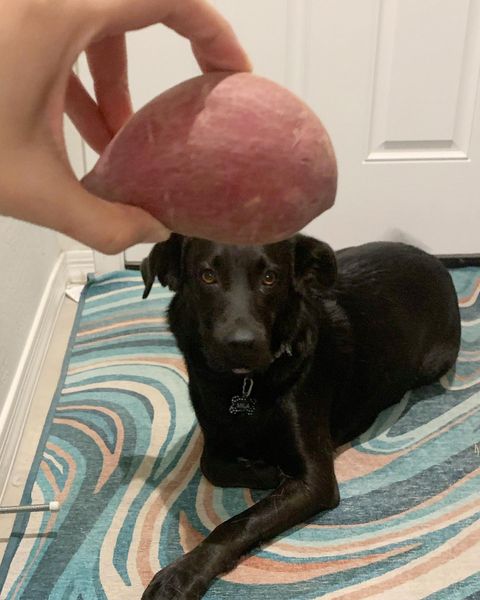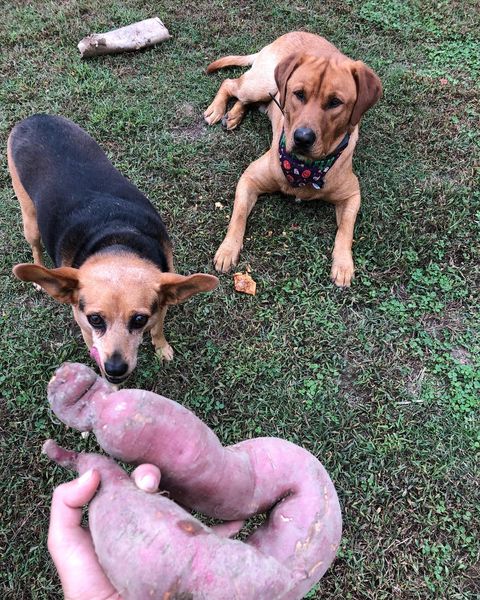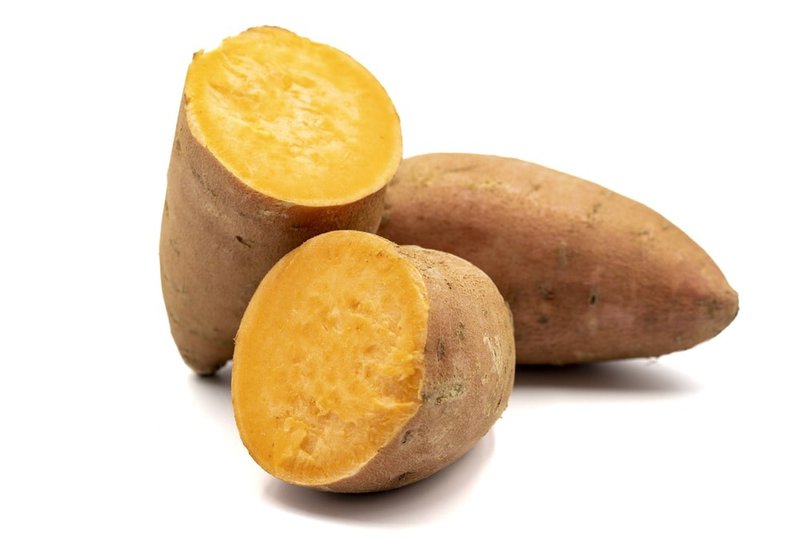Not everyone will agree with dogs being man’s best friend, but they make great company. Depending on their breed, some love to cuddle up all they, and others prefer the more active routine. If your furry friend falls in the latter category, there’ll be the need for some energy boost, and carbs are the go-to. Interestingly, yam packs plenty of them, but can dogs eat yams, cooked or raw?
Yes, yams are ideal energy-boosting food for canines, provided they take it cooked, free from seasonings, and in the recommended quantity. Other than carbs, this tuber food also contains some beneficial nutrients to your dog. On the other hand, dogs should avoid eating raw yams due to toxins, like dioscorine that may cause diarrhea.
That said, it is crucial to detail how you can feed your furry friend some of this carb-rich food without any health compromise. Thankfully, this post is all you need to stay in the safe zone should you choose to feed your dog with yams.
Can Dogs Have Cooked Yams?

Yes, dogs can have cooked yams, and that’s the only recommended way to let them eat some.
Yams contain some plant toxins which can only be neutralized by boiling. An example is dioscorine, which could adversely affect your canine’s central nervous system. In the presence of heat, this soluble protein disintegrates, thereby neutralizing its effects.
What Is The Best Way To Cook Yam For Dogs?
Boiling is the best way to cook yam for dogs, and you should do so with clean water, adding nothing else to spice it up.
Boiling is most preferred because it makes the yam soft enough and detoxifies it, making it suitable for canine consumption.
Frying or roasting would make the yam hard. These could cause some inconvenience for your dog when chewing.
You must cut your yam into pieces small enough for your dog to munch and avoid adding any form of seasoning to it when cooking.
Also, always ensure that the yam boils long enough to attain sufficient softness, such that your dog will not have an issue swallowing it.
One way to know when it is soft enough is by checking it with a fork and ensuring that the utensil passes through effortlessly. Doing this ensures that the yam wouldn’t pose some problem for your canine when eating and digesting it.
Can Dogs Eat Uncooked Yams?
No, dogs must never be allowed to eat uncooked yam. Aside from the fact that it would be difficult for your canine to chew, it can lead to dietary poisoning.
Studies reveal that most yams contain harmful chemicals such as dioscorine, histamine, tannin, phytic acid, and cyanogens. Hence, if your dog eats raw yam, you should treat it as an emergency.
Take, for instance, tannin is proven to cause conditions such as colic, jaundice, hemolytic anemia, nephritis, and liver alterations to your canine friend.
Another is phytic acid which is known to inhibit nutrients like calcium and phosphorus. As a result, it can promote nutrient deficiency in canines.
Cyanogens are notorious for causing severe respiratory problems to dogs in less than thirty minutes of ingestion. First comes the rapid respiration rate and then dyspnea. A cardiac arrest is a worst-case scenario that can lead to death.
The general effects of these toxins include dizziness, vomiting, diarrhea, irregular heart rate, and ultimately, death.
Are Yams OK For Dogs?

Yes, yams are great for dogs and provide nutrients that improve dogs’ overall health. The fact that yam contains a negligible quantity of fat makes it safe for most dogs, not minding their size and weight.
Meanwhile, you must ensure that the yam is properly processed to detoxify it before feeding it to your dog.
Why Are Yams Good For Dogs?
Yams are acceptable for dogs because they are excellent sources of several micronutrients needed by dogs.
Here are some reasons yams are spot-on for dogs.
Rich In Vitamins
Yam contains vitamins A, B, and C in substantial quantities, which are required for the development of canines.
Research shows that together, these vitamins may reduce inflammation, enhance vision, and boost bone growth and reproductive ability in canines.
Improves Skeletal Health
As a great source of calcium, yam improves the overall body structure of dogs. These they do by improving the health of bones, teeth, nails, and even the coat of canines.
Improves Blood Work And Skin Health
Magnesium, zinc, potassium, and iron are essential trace elements that must be present in a dog’s diet. These improve blood production, clothing, resistance to diseases, and many more.
There is also evidence to suggest that zinc is vital to sustaining and improving skin health in canines.
How Much Yams Can I Give My Dog?
The quantity of yam you can give your dog varies with its lifestyle.
If your canine friend has a high activity level, that implies the need for more carbs, unlike the couch-loving ones.
For an adult dog, a slice of yam each meal is sufficient. Too much quantity of yam and at high regularity can lead to an increase in blood sugar of your canine. Smaller dogs would have a smaller amount.
Can Dogs Be Allergic To Yam?
The chances of a dog being allergic to a well-prepared yam is very slim. Dogs are often more allergic to proteins and not carbohydrates. Yam contains lots of carbs, but this is nothing to worry about so long you don’t overfeed your dog with it.
Are Yams Toxic?
Yams are generally non-toxic to canines as long as they are not fed raw or undergo some form of processing.
Thankfully, although yams naturally contain some toxins which are unhealthy for your furry friend, they break down in the presence of heat. Soon after boiling, the boiled yam becomes safe for canine consumption.
Notwithstanding, you’ll need to be careful of the type of yam you wish to give your four-legged friend. Meanwhile, be intentional about the quantity of yam that you give your canine.

Which Yam Is Poisonous?
Beware! Wild yams contain several toxins and pose serious health risks to your dog.
So, cooked or not, wild yams are bad for canines, and you must avoid feeding them to your dogs by all means.
Meanwhile, bitter yam also possesses high chemical constituents that are unhealthy for canines. There is the risk of not processing them enough to make them edible for your four-legged friend.
Generally, all yams are poisonous to a level and require some processing if they would be healthy to feed to your Fido.
Do Yams Constipate Dogs?
Yams do not constipate dogs. Instead, they are a fine addition to the diet of a dog suffering from constipation due to their high fiber content.
A constipating dog needs fiber to absorb some moisture in the stool and add some mass to it. That improves the bowel movement of the canine, making it easier to pass stool.
On that note, yams are good to stall constipation and diarrhea in canines.





